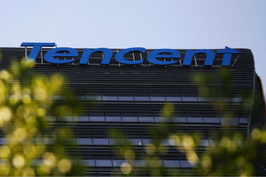U.S. Vetoes China Bid for Minority Stake in Mapping Company Here

A Chinese group that included internet giant Tencent Holdings Ltd. scrapped its plan to buy 10% of European mapping company Here International NV after the U.S. vetoed the deal on national security grounds in the latest sign of growing resistance to such sales by the Donald Trump administration.
Plans by the syndicate, which also included Beijing-based digital mapping company NavInfo Co. and Singaporean sovereign wealth fund GIC, failed to win clearance from the Committee on Foreign Investment in the United States (CFIUS), which must clear all such deals for national security considerations, NavInfo said in a statement.
The Chinese group announced its plan in December, which would have given it the right to appoint one member to the board of Amsterdam-based Here, the former mapping unit of Nokia Corp. The deal won antitrust clearance from Germany in January. The Chinese group spent over five months communicating with CFIUS and amending its proposals but still couldn’t get approval by the deadline, NavInfo said.
Here — owned by carmakers BMW AG, Daimler AG, Volkswagen AG’s Audi unit, and U.S. chipmaker Intel Corp. — is developing three-dimensional maps for self-driving vehicles and location-based services used by online and logistics companies. The company has some operations in Chicago. The current owners bought Here from Nokia in 2015 for 2.55 billion euros ($2.80 billion at the time), with plans to position it as an alternate to the more-popular rival service from U.S. giant Google Inc.
Even though the Here deal involves just a 10% stake, CFIUS can review and veto such deals if it believes they could result in foreigners gaining control of a U.S. business, a CFIUS lawyer told Caixin.
NavInfo added that the decision will not affect its existing cooperation with Here. The two companies have plans to form a 50-50 joint venture in China.
Chinese investments in U.S. technology companies have come under increasing scrutiny from CFIUS as U.S. officials have been especially concerned that such acquisitions could endanger sensitive American technologies and personal information.
Earlier this month, Trump blocked a China-backed investor from buying an American semiconductor-maker over national security concerns. The $1.3 billion plan by Canyon Bridge, a China-backed private equity group, to acquire Lattice Semiconductor Corp., went before CFIUS three times without winning approval.
In December, then-U.S. President Barack Obama blocked a Chinese company from buying German semiconductor-equipment supplier Aixtron SE over national security risks.
And last year, CFIUS also blocked Dutch electronics giant Royal Philips NV’s plan to sell its Lumileds lighting business to a Chinese fund.
These moves could signal more aggressive scrutiny of China-linked deals by CFIUS, especially as Trump is seeking to take a tough line on China’s trade and investment practices.
Other Chinese deals are also still pending before the panel. Ant Financial Services Group is expected to submit its third application to CFIUS for its $1.2 billion takeover of MoneyGram International Inc., according to previous media reports. China-based semiconductor investment fund Unic Capital Management’s $580 million acquisition of U.S. semiconductor testing company Xcerra Corp. is also awaiting the panel’s approval.
Contact reporter Han Wei (weihan@caixin.com)
- 1Cover Story: China Carves Out a Narrow Path for Offshore Asset Tokenization
- 2Drownings Shake Chinese Enthusiasm for Travel to Russia
- 3Over Half of China’s Provinces Cut Revenue Targets
- 4Li Ka-Shing’s Port Empire Hit by Forced Takeover Amid Panama Legal Dispute
- 5In Depth: China’s Mutual Fund Industry Faces Overhaul After a Banner 2025
- 1Power To The People: Pintec Serves A Booming Consumer Class
- 2Largest hotel group in Europe accepts UnionPay
- 3UnionPay mobile QuickPass debuts in Hong Kong
- 4UnionPay International launches premium catering privilege U Dining Collection
- 5UnionPay International’s U Plan has covered over 1600 stores overseas






